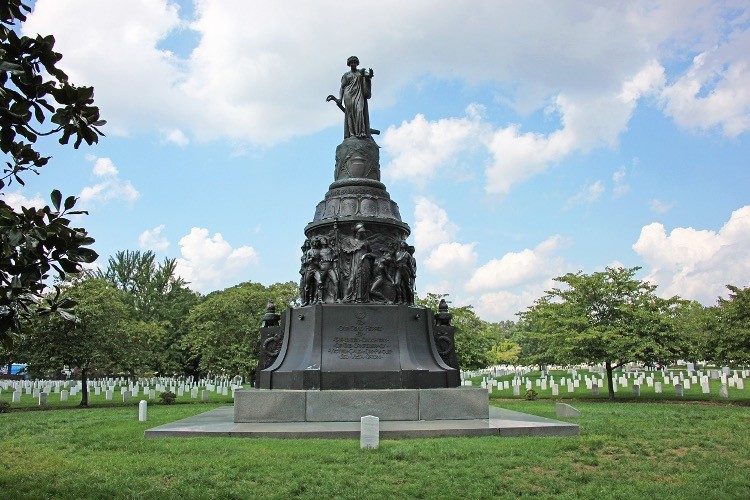
On November 12, 1912, a ceremony was held to lay the cornerstone of the Confederate Memorial at Arlington National Cemetery. The ceremony featured William Jennings Bryan, a three-time Democrat candidate for president, and James Tanner, a former Union corporal. The monument was intended as symbolic of the spirit of reconciliation, that the country was complete after the Union was torn asunder in the American Civil War.
Recently, however, the Naming Commission that pushed for changing the names of several Army posts in the South, such as Fort Hood and Fort Bragg (which were also named in a spirit of reconciliation) has recommended that this Confederate monument be removed.
Tanner, who participated with Bryan in the ceremony, was not just any Union veteran. He was the national commander of the Grand Army of the Republic, the organization of Union veterans. Tanner lost both legs at the Battle of Second Manassas (alternatively known as Bull Run). In 1914, when the monument was unveiled, veterans from both sides placed wreaths on the monument.
Each Memorial Day, the president of the United States sends a floral tribute to be placed at the foot of the monument. When some historians, including James McPherson, urged President Barack Obama to terminate that tradition, he refused and continued the tradition.
The monument was constructed by Moses Jacob Ezekiel, a Confederate veteran who was the first Jewish cadet at Virginia Military Institute. He was among the cadets at VMI who fought in the Battle of New Market, winning that battle. Ten cadets died in the battle, but Ezekiel survived to achieve notoriety as a sculptor.
Following the Spanish-American War of 1898, it was noted that many ex-Confederates fought in the U.S. Army, leading many to conclude that the bitterness of the Civil War was fading. This led to flags that had been captured during the war being returned to the southern states.
In 1900, Marcus Wright, who had served as a general in the Confederate army, proposed legislation that would allow a section of the cemetery to be set aside for Confederate soldiers. This led to all Confederate soldiers who had already been buried at Arlington and in the Soldiers Cemetery in Washington, D.C., to be re-interred in the new Confederate section. A total of 482 individuals were buried at Arlington, including 46 officers, 352 enlisted men, 58 wives, 15 civilians, and 12 unknown soldiers.
Soon after, the United Daughters of the Confederacy petitioned Congress to place a monument in the Confederate section, and this was done eventually by Secretary of War William Howard Taft in 1906. Ezekiel died in 1917, and was eventually reinterred there in 1921.
Why would anyone want to remove a monument that is so symbolic of the national reconciliation that had taken place?
In short, because the philosophy of Marxism has become more powerful in our country in recent years. We have seen this in the past few years as Confederate monuments and symbols were attacked, removed, and desecrated, usually with the argument that they somehow represented racism. As many, including this writer, warned at the time, the Confederates were just the low-hanging fruit. The assault on any remembrance of the Confederacy was simply laying the foundation for a broader assault on American heritage, as monuments honoring George Washington, Thomas Jefferson, and even Abraham Lincoln were targeted as symbols of “white supremacy.” Even Mount Rushmore has been called a symbol of white supremacy by these radicals.
“The Communists disdain to conceal their views and aims,” said Karl Marx, the author of the Communist Manifesto, which he wrote for the League of the Just, soon to change their name to the Communist League. “They openly declare that their ends can be attained only by the forcible overthrow of all existing social conditions.” (Emphasis added).
Note that it was not just the “capitalist” economic system that Marxists target, but rather all existing social conditions. Certainly, Marx called for the abolition of private property, but that was not all he desired to eradicate.
He favored the abolition of the family, which he condemned as a tool of the “bourgeoisie,” his term for the middle-class, which he viewed as the foundation of capitalist society. Is it any surprise that leftists often sneer at what they call “middle-class values”? You know, things such as hard work, respect for law, and the upholding of morality?
Marx and his fellow communists also opposed the idea of the dignity of the individual. For him, it was the collective that was important. He likewise saw religion — particularly Judaism and Christianity — as an institution that needed abolition.
The idea of separate, independent nations was opposed by Marx, arguing, “The working men have no country.”
Finally, Marx believed it was necessary to wipe out knowledge of the past. “In bourgeoisie society,” Marx wrote, “the past dominates the present; in Communist society, the present dominates the past.” Any totalitarian society must control a people’s concept of history. As George Orwell put it in his dystopian novel, 1984, “He who controls the past controls the future, he who controls the present controls the past.”
This is why there can be no heroic figures of the past, other than those favored by communists. Knowing, no doubt, that a frontal assault on American heroes such as George Washington would be unsuccessful, they first had to undermine the very founding ideas of the country. First, one eliminates the remembrance of Confederates, except to falsely say that they were fighting to preserve the enslavement of black people, then using that falsehood to undermine the Declaration of Independence, the Constitution, and the ideas of liberty and limited government that they rest upon.
Make no mistake — these American Taliban are not going to stop at the removal of the Confederate Memorial at Arlington National Cemetery. They will not be satisfied until all of American society is transformed into one that will fit into the dreams of Karl Marx.


